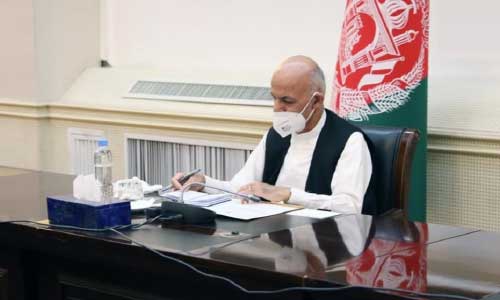KABUL - In a major step towards kick-starting intra-Afghan peace talks, President Ashraf Ghani on Saturday approved 48 candidates as members of the High Council for National Reconciliation.
Ghani signed a decree to this effect and included a cross-sector of the Afghan society, including former president Hamid Karzai, Hizb-e-Islami leader Gulbuddin Hekmatyar, former mujahideen leader Abdul Rasul Sayyaf, former vice president Marshal Abdul Rashid Dostum, former Balkh governor Atta Mohammad Noor and other well known Afghan figures.
The high council is led by former CEO Abdullah Abdullah and will be directly involved in dealing with peace talks. However, the body will only facilitate talks and is not a decision-making body.
Ghani’s decree comes just days after Abdullah announced that talks could start in Doha this week.
However, no details have yet been released nor has a confirmed date been announced.
The talks hit a stumbling block earlier this month after Ghani held back on releasing the final 320 Taliban prisoners – a precondition set in the Doha agreement between the US and Taliban in February.
This agreement, which was reportedly not sanctioned by the Afghan government, set out conditions that the Taliban should release 1,000 Afghan government personnel and the Afghan government should release 5,000 Taliban prisoners before talks could start.
Over the past few months, Ghani has released more than 5,000 prisoners but has been hesitant to free 320 on the Taliban’s list. Considered hardcore, many of these prisoners have masterminded some of the worst attacks in Afghanistan while others are drug kingpins.
However, Ghani’s latest move indicates that preparations could be underway to pave the way for the start of intra-Afghan talks.
The names released in Saturday’s decree are as follows:
The leadership of the council is made up of 10 members including the chairman Abdullah Abdullah.
Three deputies include Abdul Salam Rahimi, Enayatullah Farahmand, and Asadullah Saadati, deputy chairman.
The rest are Zuhra Mutahari, former deputy governor of Paktia; member of Afghanistan’s Ulema Council Atta-Ur-Rahman Salim; head of Hizb-e-Islami Nawin Din Mohammad; political figure Akram Khpulwak; head of the negotiation team Mohammad Masoom Stanekzai; and special presidential envoy Noor-Ul-Haq Olumi.
Other members are: Former president Hamid Karzai; former mujahideen leader Abdul Rasul Sayyaf; Hizb-e-Islami leader Gulbuddin Hekmatyar; former vice president Mohammad Karim Khalili; former deputy chief executive Mohammad Mohaqiq; former vice president Marshal Abdul Rashid Dostum; former vice president Mohammad Yunus Qanooni; former foreign minister Salahuddin Rabbani; former mujahideen leader and ex-minister of energy and water Mohammad Ismalil Khan; former Balkh governor Atta Mohammad Noor; head of Maaz-e-Milli party Sayed Hamid Gailani; Zabihullah Mujaddedi; Sayed Mansoor Nadery; Enayatullah Shahrani; Mohammad Khan; head of Afghanistan’s Ulema Council Sadiq Modabir; Mohammad Ismail Ghazanfar and Mawlawi Khodaidad Saleh.
Government representatives are: First Vice President Amrullah Saleh; Second Vice President Mohammad Sarwar Danesh; Acting Foreign Minister Mohammad Haneef Atmar; National Security Advisor Hamdullah Mohib; Meshrano Jirga Speaker Fazl Hadi Muslimyar; Wolesi Jirga Speaker Mir Rahman Rahmani; presidential adviser Almas Zahid; presidential advisor Mawlawi Jora Tahiri. An additional member, the state minister for peace affairs, will also be appointed a member once the position has been filled.
Women will also be represented and eight have been appointed to the council.
They are: Civil society activist Safia Sediqqi; former MP Najiba Ayubi; a member of the Afghan Women’s Network Mari Akrami; civil society activist Zia Gul Rezaee; member of the Independent Administrative Reform and Civil Service Commission Alia Yulmaz; former higher education minister Farida Mohmand; chairperson of medical council of Afghanistan Nasrin Oryakhil and civil society activist Zarqa Yaftali. (ATN)
Home » Afghanistan » In Peace Talks Move, Ghani Appoints 48 as Reconciliation Council Members
In Peace Talks Move, Ghani Appoints 48 as Reconciliation Council Members

